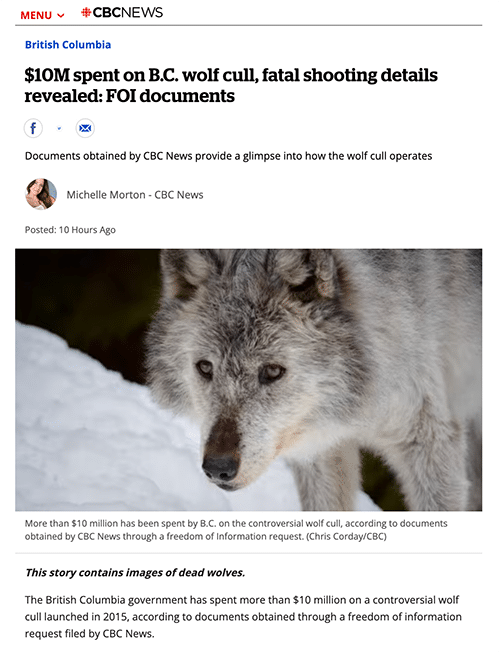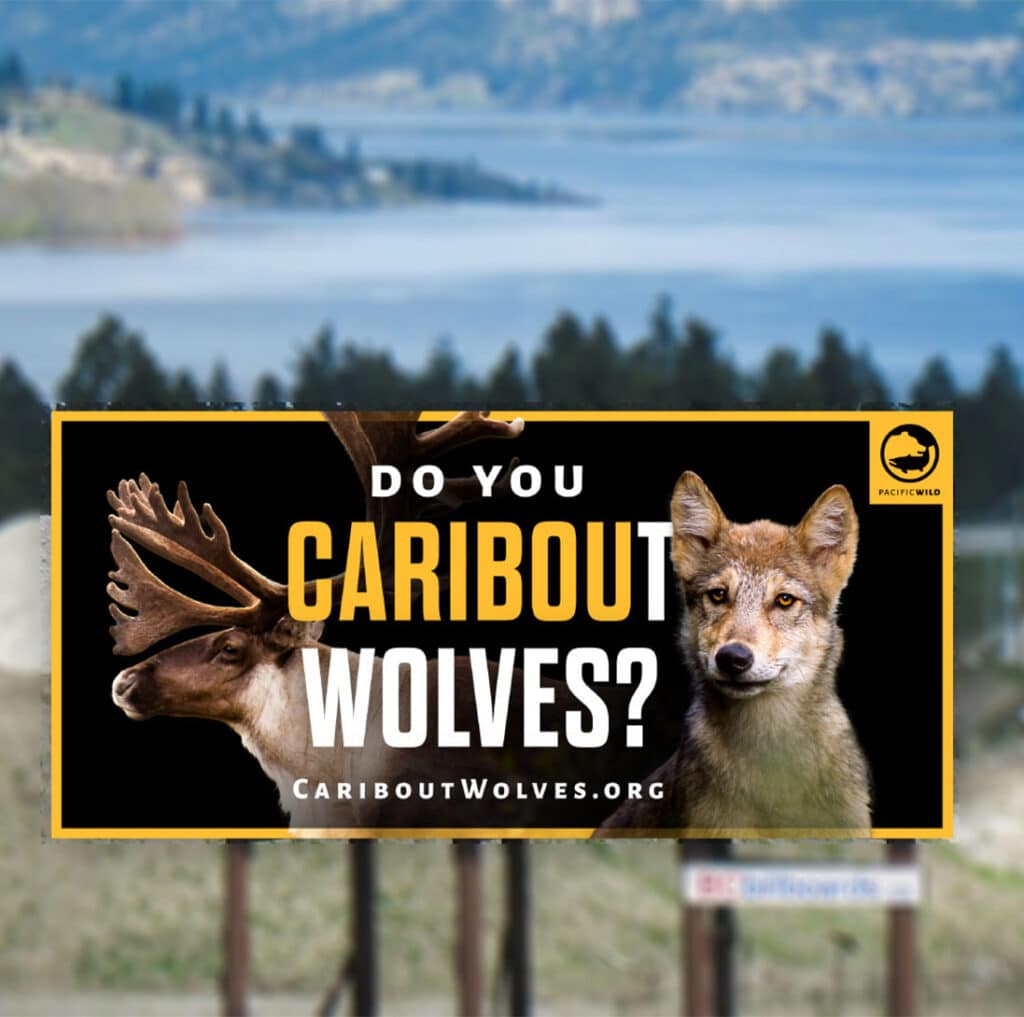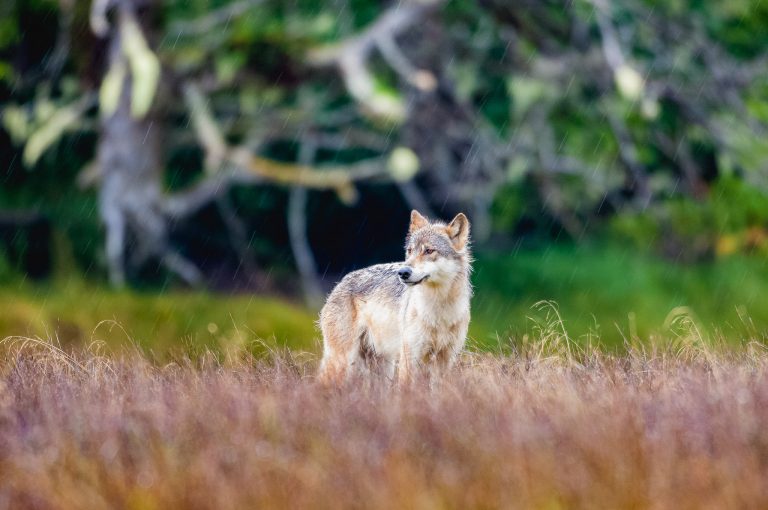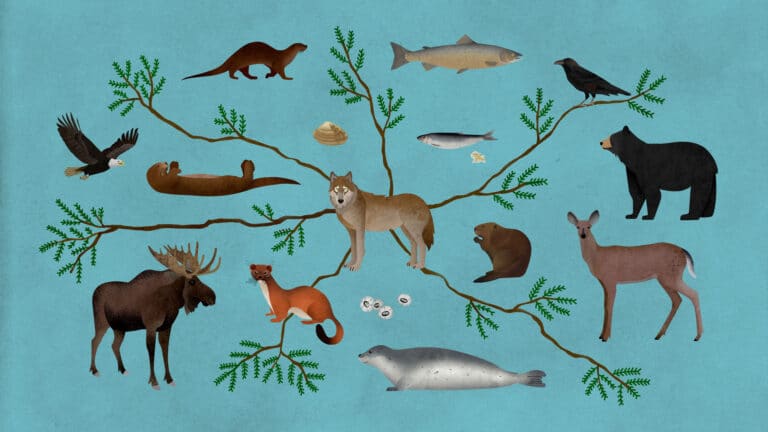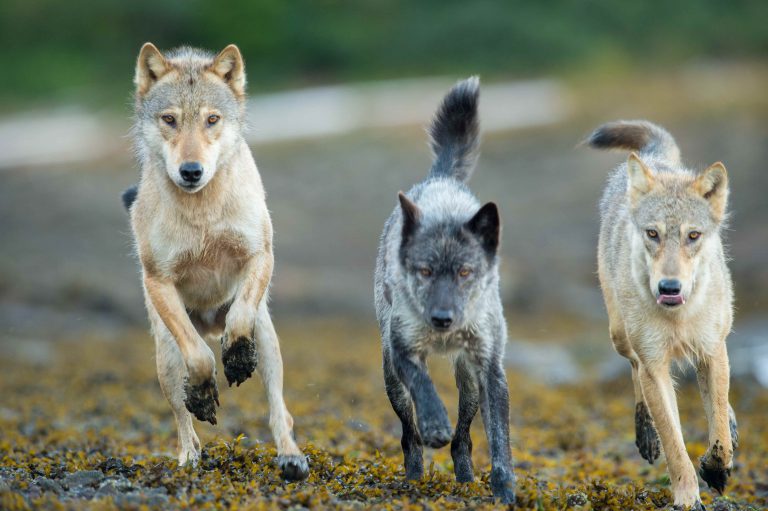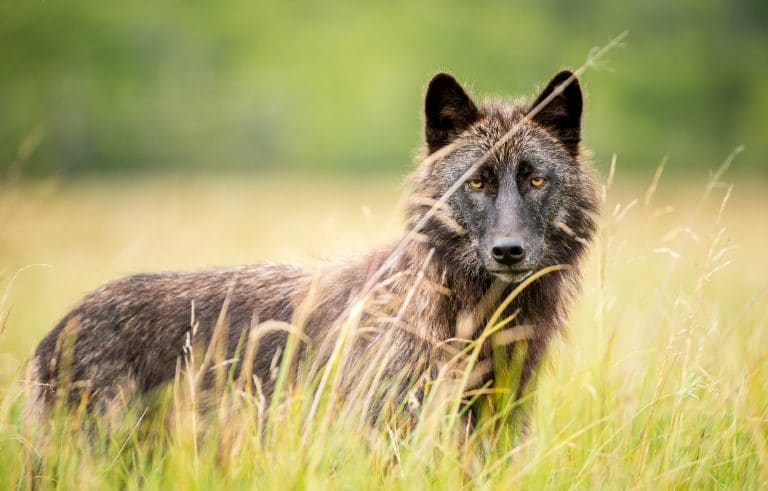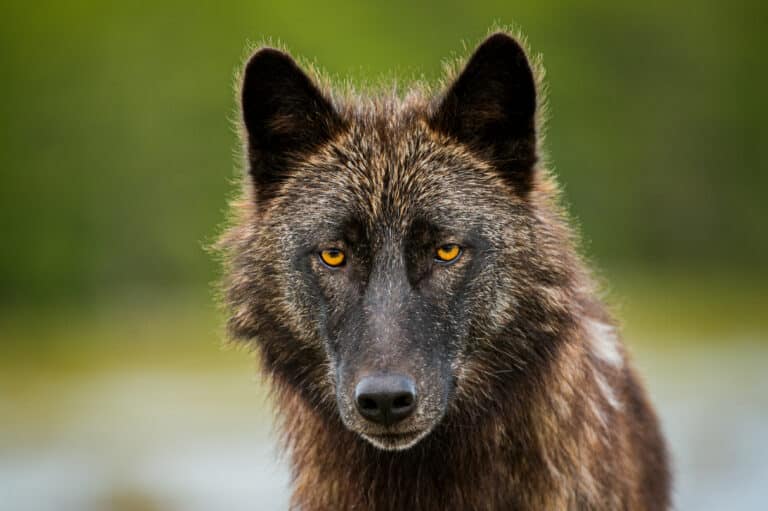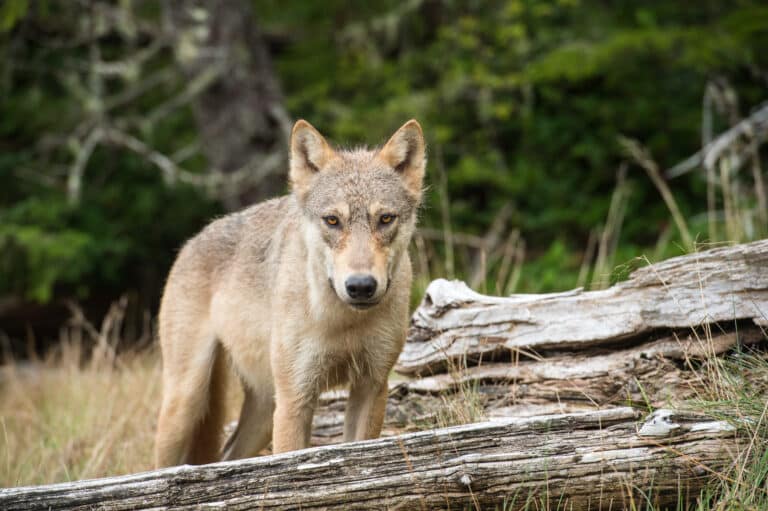Save BC Wolves
Wolves are legally exterminated throughout British Columbia. These highly intelligent and social animals are hunted, trapped and shot from helicopters due to misguided and ineffective wildlife management policy. B.C.’s wolf cull program is an ecologically, economically, and ethically offensive approach to wolf “management”.
Our Goal
Our goal is to stop the wolf cull and #SaveBCWolves. We work to resist ongoing efforts to escalate the persecution of wolves across the province. Together, we can stop the kill program and ensure wolves are given the protection and respect they deserve as apex predators and ecosystem engineers.
THE WOLF CULL
recent developments
BREAKING NEWS: $10 million spent on B.C. wolf cull, fatal shooting details revealed
Today CBC News confirmed through a Freedom of Information (FOI) request that the British Columbia government has spent over $10 million killing 1944 wolves over the last eight years. 2024 will be the year that we mark the killing of over 2000 wolves from helicopters.
EARLIER THIS YEAR
On January 18th 2023, Pacific Wild issued an open letter titled Troubled Triggers: Correcting the Aim on B.C.’s Wolf Cull. In this letter, we outline that the government is in possession of a database of over 600 images and videos taken of the wolf cull. We believe that these images represent documentation that would allow for the independent verification and assessment of the humane nature of this wolf kill program. Read our latest press release: B.C. Government Releases Disturbing Wolf Cull Images
Global BC released photos on February 24, 2023 taken by a former conservation, of a wolf that was euthanized in Alberta to end its suffering after a non-responsive radio collar was found to have been strangling the wolf to death over an extended period.
The radio collar had been put on the wolf in B.C. when it was a juvenile as part of the wolf cull program that to date has killed 1944 wolves. To learn more about Judas wolves and the aerial wolf cull watch our video.
the cariboutwolves billboard project
Since June 1, a new digital billboard has been running on the approach to Kelowna via West Bank in the Okanagan.
This project started with a $1000 donation from Okanagan resident Fiona C., and cariboutwolves.org leads interior residents and visitors to a new campaign page showing why only habitat protection and functional restoration of disturbed landscapes will save caribou on the landscape.
The wolf cull was never going to work, because the only answer to protect endangered or threatened caribou herds is HABITAT.
HISTORY OF AERIAL WOLF KILLING PROGRAM
British Columbia’s 2007 Mountain Caribou Recovery Implementation Plan (MCRIP) has failed to halt the decline of southern mountain caribou. Since 2007, at least six subpopulations of endangered caribou have been declared locally extinct (Purcells Central, Monashee, George Mountain, South Purcells, South Selkirk, and Burnt Pine). In 2015, in an attempt to save caribou, the provincial government launched a multi-year wolf kill program in the South Peace and South Selkirk regions. The program has since been expanded to include the North Columbia, Tweedsmuir-Entiako, Hart Ranges, and Itcha-Ilgachuz regions. To date, 1,944 wolves have been killed.
The government’s decision to scapegoat wolves represents a failure to protect and restore habitat required for mountain caribou to thrive; old-growth forests that have been fragmented and destroyed by industrial logging, oil and gas exploration and recreational activity (snowmobiling, heliskiing, cat skiing). Over decades, these impacts have left many populations of caribou in serious decline, without habitat they need for their specialized diets and protection from predators. A 2020 study showed that over 900 square kilometres of identified critical habitat has been logged since 2014. In addition, the province is considering the approval of at least two mines in critical habitat, with one in the calving grounds of an endangered caribou herd.
To date, the wolf cull program has killed 1944 wolves and cost taxpayers over 10 million dollars. Culling wolves will not change the negative impacts of unsustainable logging activity and the government’s complicity in the loss of caribou. Habitat destruction, the main driver of caribou decline, continues to be ignored. These herds were pushed to the brink of extinction by the continued exploitation of critical habitat from resource extraction and motorized recreation, yet wolves pay the ultimate price.
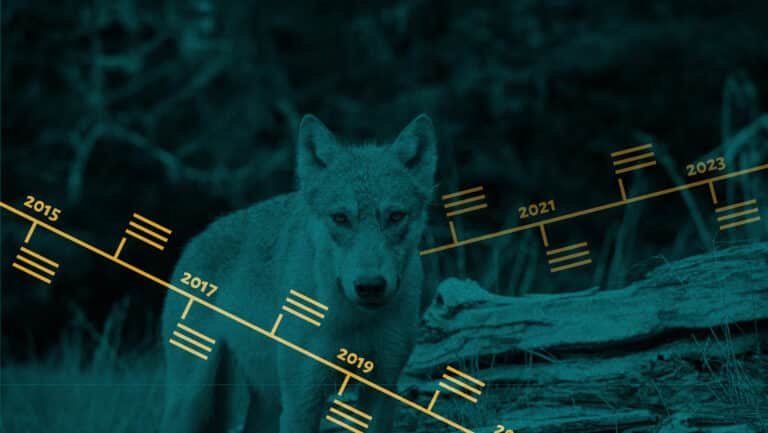
BC Wolf Cull Timeline
An overview of the B.C. government’s long-term, multi-million dollar wolf kill program.
Reasons to Oppose the Wolf Cull
- Research by scientists at the University of Alberta suggests killing wolves wasn’t saving caribou in areas where caribou were most vulnerable and at risk.
- The wolf cull fails to acknowledge the important role wolves play as apex predators and ecosystem engineers.
- The government is not protecting additional caribou habitat. Without the immediate protection of identified critical habitat, caribou are bound to go extinct.
- Shooting wolves from helicopters is an inhumane method of euthanasia. Many of these wolves will be wounded and left to die in the snow.
- There is no public oversight of the killing operation.
- British Columbia is one of only two Canadian provinces that has not adopted the Canadian Council on Animal Care standards that guide the welfare and humane treatment of wild and domestic animals.
- Wolves are highly intelligent, social animals that live in dynamic family groups. The cull exposes wolves to traumatic instances where they watch pack members chased to exhaustion and shot from helicopters, as seen by the use of the “Judas wolf” tactic.
- The legality of the wolf cull was challenged by Pacific Wild. We argued that in our view, the authority to cull wolves by aircraft had been inappropriately given to regional managers under current Wildlife Act regulations. The majority of wolf killings have occurred via civilians (contracted by the government) shooting from helicopters which we said also breaks federal aviation laws. Read about our court case ruling and Global News coverage here.
the sea wolves of british columbia
Wolves in the Great Bear Rainforest are different; they are genetically distinct from inland grey wolves. The population carries more genetic diversity because it has never been through a population bottleneck, the term used to describe the severe depletion of a population followed by a resurgence in numbers originating from only a few individuals. Rainforest wolves inhabit all environments along the mainland coast and adjacent islands, but not the offshore archipelago of Haida Gwaii. They live almost exclusively on deer and what the ocean provides, including salmon, herring roe and even seals and sea lions.
In B.C., all wolves are subject to the provincial government’s Wolf Management Plan, updated and released in April, 2014. The plan does not appropriately address the societal, ecological and economic roles that only healthy populations of wild wolves can fulfill. Instead, the plan, based on faulty estimates of population growth and potentially biased beliefs about impacts to cattle ranchers, is mainly focused on wolf control. In 2010, approximately 1,400 wolves were reported killed – 12-26% of the estimated number of wolves in the province, and the highest mortality rate since 1976. Under the management plan, it is legal to hunt wolves without any special license in most regions of the Great Bear Rainforest ten and a half months out of the year; in Tweedsmuir Park it is legal seven months out of the year.

